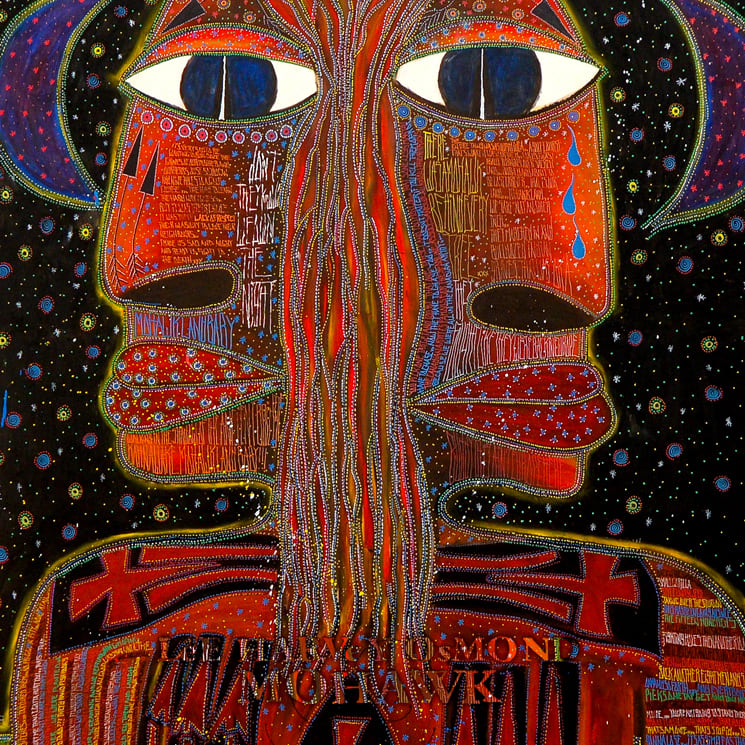When the prolific Tom Wilson (Junkhouse, Blackie and the Rodeo Kings) launched Lee Harvey Osmond as a solo project with A Quiet Evil in 2008, few could have predicted LHO would still be going strong a decade later.
They have yet to achieve the wider profile of those other outfits, but Mohawk, the fourth Lee Harvey Osmond record, confirms there's still plenty of pleasure to be gained from Wilson's bluesy and psychedelic takes on roots music. It is rather a misnomer to call LHO a solo venture, as Wilson has again surrounded himself with an A-list cast of Canadian peers, including his BARK rhythm section of Gary Craig and John Dymond, bassist Anna Ruddick, guitarists Bill Dillon and Aaron Goldstein, horn player Darcy Hepner, keyboardist Jesse O'Brien harmonica player Paul Reddick, and son Thompson Wilson, who co-wrote two songs here. The harmony vocals of Oh Susanna add texture and light to such tunes as "Whole Damn World" and "What I Loved About You."
Wilson and producer/engineer Michael Timmins (Cowboy Junkies) aren't afraid to throw disparate sonic elements into the mix, and the decisions work. Horns and harmonica blend perfectly on "Colours," while "Forty Light Years," an album highlight co-written with Colin James and Jesse O'Brien, features horns, backing vocals from Oh Susanna, plus steel and electric guitars, yet never sounds cluttered.
The primary focus remains Wilson's distinctive voice and colourfully poetic lyrics. His trademark deep and dirty vocals sound like they've been freshly dredged from the Mississippi mud, and he occasionally adopts more of a spoken word approach. That shines on the epic seven-minute title track, a powerfully moving number inspired by Wilson's discovery a few years back that he is of Mohawk heritage (that life-changing revelation also fuelled his acclaimed memoir, Beautiful Scars). "Mohawk" is songwriting at its most confessional: "I'm going to meet my sisters for the very first time and the saliva in my mouth is thick, like motor oil."
One tune here likely already familiar is "A Common Disaster," one of Cowboy Junkies' most popular songs. Wilson's version doesn't veer too far from the original, but is a fresh take on a lovely song.
(Latent)They have yet to achieve the wider profile of those other outfits, but Mohawk, the fourth Lee Harvey Osmond record, confirms there's still plenty of pleasure to be gained from Wilson's bluesy and psychedelic takes on roots music. It is rather a misnomer to call LHO a solo venture, as Wilson has again surrounded himself with an A-list cast of Canadian peers, including his BARK rhythm section of Gary Craig and John Dymond, bassist Anna Ruddick, guitarists Bill Dillon and Aaron Goldstein, horn player Darcy Hepner, keyboardist Jesse O'Brien harmonica player Paul Reddick, and son Thompson Wilson, who co-wrote two songs here. The harmony vocals of Oh Susanna add texture and light to such tunes as "Whole Damn World" and "What I Loved About You."
Wilson and producer/engineer Michael Timmins (Cowboy Junkies) aren't afraid to throw disparate sonic elements into the mix, and the decisions work. Horns and harmonica blend perfectly on "Colours," while "Forty Light Years," an album highlight co-written with Colin James and Jesse O'Brien, features horns, backing vocals from Oh Susanna, plus steel and electric guitars, yet never sounds cluttered.
The primary focus remains Wilson's distinctive voice and colourfully poetic lyrics. His trademark deep and dirty vocals sound like they've been freshly dredged from the Mississippi mud, and he occasionally adopts more of a spoken word approach. That shines on the epic seven-minute title track, a powerfully moving number inspired by Wilson's discovery a few years back that he is of Mohawk heritage (that life-changing revelation also fuelled his acclaimed memoir, Beautiful Scars). "Mohawk" is songwriting at its most confessional: "I'm going to meet my sisters for the very first time and the saliva in my mouth is thick, like motor oil."
One tune here likely already familiar is "A Common Disaster," one of Cowboy Junkies' most popular songs. Wilson's version doesn't veer too far from the original, but is a fresh take on a lovely song.
